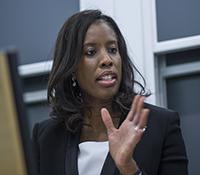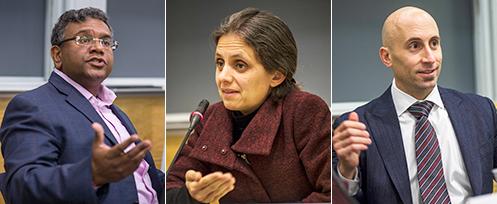Cross Border Transactional Practice: How Emerging Markets Are Shifting the Paradigm
Corporate Attorneys—Including Alumni—Talk to Columbia Law School Students About How Cross-Border Transactional Work is Becoming Ever More Global.
New York, November 24, 2014—Emerging foreign markets offer tremendous opportunity and significant risk, said seasoned corporate transactional attorneys in a Nov. 13 talk at Columbia Law School. Petal Modeste, assistant dean and dean of career services, led the wide-ranging discussion, which was held to benefit students who are especially interested in domestic and international transactional practice.
| Petal Modeste, assistant dean and dean of career services |
“It’s rare today, when one company buys another, for there not to be a foreign component,” said Valérie DeMont ’95 LL.M, a partner at Pepper Hamilton. “Cross-border work is everywhere, from joint ventures to taxes and intellectual property.”
Demont was joined on the panel by Paul Denaro ’99, a partner at Milbank, Tweed, Hadley & McCloy, and Amit Shashank, general counsel and secretary for Aricent, a privately held software and technology services company.
The attorneys said investors find many of their most attractive—and potentially lucrative—opportunities in developing markets rather than in the more mature markets in Europe and the United States.
“In China and India social and economic mobility are creating new markets to tap, while in Brazil the markets are simply too large to be ignored,” said Shashank. “Today no private equity, no large institution, can ignore those opportunities because markets in the U.S. and Europe have to some extent dried up.”
Denaro, who practices primarily in Latin America, said it’s important for attorneys to keep up with global trends and developments in regions where they practice.
“Keep apprised of what’s going on in the world,” he said. “Many Latin American markets have slowed in the last few years, while Peru, Colombia, and Chile have emerged as very investment-oriented regional leaders.”
DeMont agreed, but also warned that developing nations often face issues of instability and weak institutions.
“You have to read to understand why countries are doing what they’re doing, and be intellectually curious,” she said. “Taxes, inflation, and corruption are all issues that are very different in different countries. A better understanding of what’s shaping the world and how everything is interconnected makes you more flexible in your thinking.”
| (l-r) Amit Shashank, general counsel of Aricent; Valérie DeMont ’95 LL.M, a partner at Pepper Hamilton; and Paul Denaro '99, a partner at Milbank, Tweed, Hadley & McCloy. |
The attorneys advised students to stay curious and to learn as much as they could about the peoples and cultures with whom they have opportunities to collaborate.
“Working abroad and seeing how many others live makes you a bigger person who better appreciates the luxuries in New York,” said Denaro, recounting his experiences practicing in remote villages in South America.
The panel was sponsored by the Office of Career Services and Professional Development, the Columbia Business and Law Association, and the Journal of Transnational Law.

